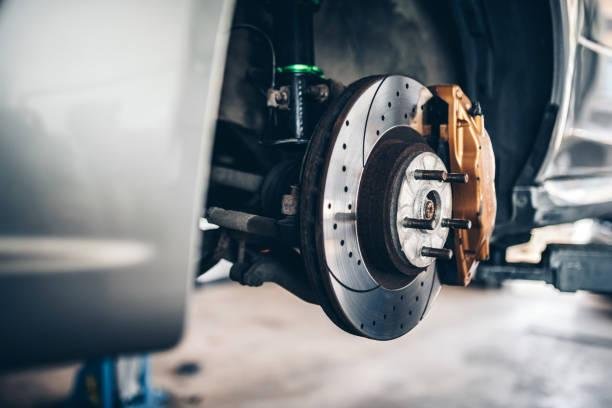The braking system is one of the most critical components of any vehicle, but for semi-trucks, it is even more essential due to their massive size and weight. Semi-trucks can weigh up to 80,000 pounds when fully loaded, and stopping such a large vehicle requires a well-maintained and efficient brake system. Brake safety is not only crucial for the protection of the driver but also for the safety of other road users. In this article, we will explore the importance of semi-truck brake safety, the risks associated with brake failure, and how drivers and fleet operators can ensure that their braking systems remain reliable and effective.
1. Why Brake Safety Matters
Brake safety is vital for semi-trucks for several reasons:
– Preventing Accidents
The primary function of brakes is to slow down or stop a vehicle. For semi-trucks, which are often carrying heavy loads, the ability to stop efficiently is paramount. A semi-truck traveling at highway speeds requires a much longer distance to come to a complete stop than a regular passenger vehicle. If the brakes are not functioning properly, the truck may not be able to stop in time, leading to severe accidents.
– Protecting Lives
Truck-related accidents can have devastating consequences, not just for the truck driver but for other motorists on the road. Brake failures are a leading cause of accidents involving semi-trucks. Ensuring the brakes are in good working order can significantly reduce the risk of fatal collisions.
– Compliance with Safety Regulations
The Federal Motor Carrier Safety Administration (FMCSA) has stringent regulations for commercial vehicles, including semi-trucks. These regulations include regular brake inspections and maintenance to ensure that trucks are safe to operate on public roads. Failure to comply with these regulations can result in fines, penalties, or even the suspension of operating licenses.
– Minimizing Downtime
A well-maintained brake system reduces the risk of unexpected breakdowns. Brake failures can lead to expensive repairs and vehicle downtime, which can negatively impact a trucking company’s operations. Regular brake maintenance helps to avoid these costly issues and ensures that trucks remain on the road.
2. Common Causes of Semi-Truck Brake Failure
Understanding the causes of brake failure is essential for preventing accidents and maintaining brake safety. Some of the most common causes of brake failure in semi-trucks include:
– Overheating
Brake systems can overheat when they are used too frequently or under excessive pressure. Overheating can cause brake fade, where the brake pads become less effective at stopping the truck. This can happen during long downhill descents or in stop-and-go traffic.
– Worn Brake Pads
Brake pads are designed to wear down over time, but if they are not replaced when they become too thin, they can fail to provide enough friction to stop the truck. Worn brake pads can also cause damage to other components, such as the rotors and calipers.
– Air Brake System Malfunctions
Most semi-trucks use air brakes, which rely on compressed air to apply pressure to the brake pads. If there is a leak in the air brake system or if the air pressure is too low, the brakes may not engage properly, leading to brake failure.
– Improper Maintenance
Routine maintenance is critical for ensuring brake safety. Neglecting to perform regular inspections or failing to replace worn-out components can lead to brake failure. Common maintenance issues include not checking brake fluid levels, failing to inspect brake lines, or ignoring warning signs such as squealing brakes or vibrations.
– Overloading
Overloading a truck beyond its maximum weight capacity can put excessive strain on the brakes. The heavier the load, the more force is required to stop the truck. Overloading increases the risk of brake failure, especially if the brakes are already worn or damaged.
3. Signs of Brake Problems
Recognizing the early warning signs of brake problems can prevent accidents and ensure that your semi-truck’s braking system remains in good condition. Some common signs of brake issues include:
– Squeaking or Squealing Noises
These noises can indicate that the brake pads are wearing thin and need to be replaced. It can also be a sign that there is dirt or debris in the brake system, which can affect performance.
– Grinding Sounds
A grinding sound often indicates that the brake pads have worn down completely, and the metal components of the braking system are rubbing together. This can cause significant damage and should be addressed immediately.
– Vibrations
If you feel vibrations or pulsations when applying the brakes, it could indicate that the rotors are warped or that there is uneven wear on the brake pads.
– Soft or Spongy Brake Pedal
A soft or spongy brake pedal may indicate air in the brake lines or a problem with the brake fluid. This can lead to a loss of braking power and should be inspected by a professional.
– Longer Stopping Distances
If your semi-truck takes longer than usual to come to a complete stop, it could be a sign that the brakes are not functioning properly. This can be caused by worn brake pads, low air pressure, or a malfunction in the brake system.
4. How to Ensure Semi-Truck Brake Safety
Maintaining the safety and effectiveness of your semi-truck’s brakes requires a proactive approach. Here are some steps you can take to ensure that your brakes remain in optimal condition:
– Regular Brake Inspections
Schedule regular brake inspections as part of your truck’s maintenance routine. Inspections should include checking the brake pads, rotors, calipers, brake lines, and air brake system. Regular inspections can help identify potential issues before they lead to brake failure.
– Replace Brake Pads as Needed
Brake pads should be replaced when they become too thin or worn. Failing to replace worn brake pads can cause damage to other components and increase the risk of brake failure. Always use high-quality brake pads that are designed for the specific make and model of your truck.
– Check Brake Fluid and Air Pressure
Brake fluid should be checked regularly and replaced according to the manufacturer’s recommendations. Low brake fluid levels can lead to brake failure. For trucks with air brakes, ensure that the air pressure is within the recommended range and that there are no leaks in the system.
– Monitor for Warning Signs
Pay attention to any warning signs of brake problems, such as strange noises, vibrations, or reduced braking power. Addressing these issues early can prevent more significant problems down the road.
– Avoid Overloading
Always ensure that your truck is loaded within its maximum weight capacity. Overloading can put additional strain on the brakes and increase the risk of failure. Properly distribute the weight of your load to ensure even braking performance.
– Use Engine Braking
In situations where frequent braking is required, such as on long downhill slopes, use engine braking to help slow the truck down. Engine braking reduces the strain on the brake system and helps prevent overheating and brake fade.
– Train Drivers on Brake Safety
Drivers should be trained on how to use the brakes properly and how to recognize signs of brake failure. They should also be familiar with techniques such as downshifting and engine braking to reduce the reliance on the brake system.
5. The Role of Professional Brake Services
Professional brake services are essential for maintaining semi-truck brake safety. Trained technicians have the expertise to identify and repair brake problems before they lead to brake failure. Professional services can include:
– Comprehensive Brake Inspections
Technicians can perform a thorough inspection of the entire braking system, including the pads, rotors, calipers, brake fluid, and air brake system. They can also identify potential issues that may not be visible during a routine inspection.
– Brake Repairs and Replacements
If any components of the braking system are worn or damaged, professional technicians can repair or replace them. This ensures that your truck’s brakes are functioning correctly and safely.
– Brake System Adjustments
Technicians can also adjust the braking system to ensure that it is properly calibrated and functioning efficiently. This can improve braking performance and reduce wear on brake components.
For drivers in the Las Vegas area, Semi-Truck brake services in Las Vegas offer expert maintenance and repair services to keep your brakes in top condition. Regular visits to a trusted service provider can help you avoid brake failures and ensure your truck remains safe on the road.
Conclusion
Semi-truck brake safety is essential for preventing accidents, protecting lives, and ensuring that trucks comply with safety regulations. By understanding the common causes of brake failure and taking proactive steps to maintain your braking system, you can extend the life of your brakes and keep your truck running safely. Regular inspections, prompt repairs, and professional brake services are key to maintaining the reliability and safety of your semi-truck’s brakes. For expert assistance, consider reaching out to Semi-Truck brake services in Las Vegas for all your brake maintenance and repair needs.







More Stories
Maximize Your Reach | Guest Post Services UAE
The Importance of Regular Gas Boiler Service in Canford Cliffs
Must-Have Mens Suede Jackets to Buy Right Now